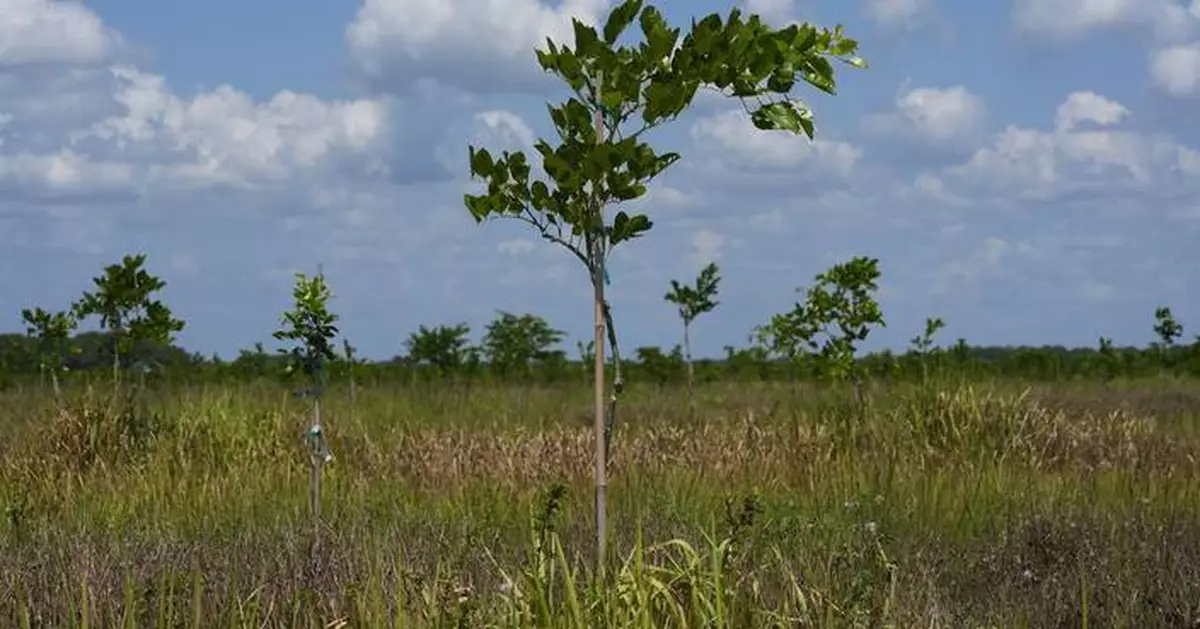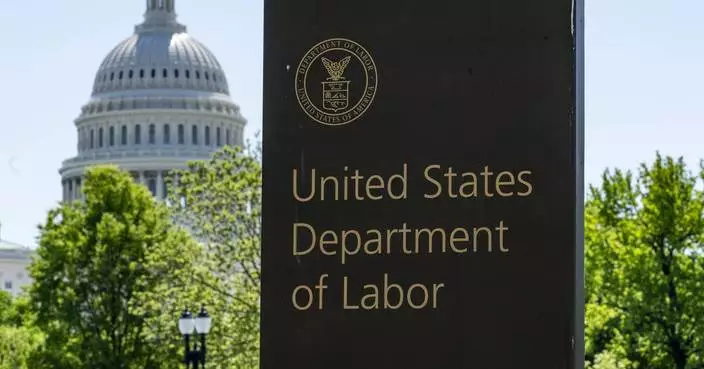An ancient tree from India is now thriving in groves where citrus trees once flourished in Florida, and could help provide the nation with renewable energy.
As large parts of the Sunshine State’s once-famous citrus industry have all but dried up over the past two decades because of two fatal diseases, greening and citrus canker, some farmers are turning to the pongamia tree, a climate-resilient tree with the potential to produce plant-based proteins and a sustainable biofuel.
Click to Gallery
Naveen Sikka, founder and CEO of Terviva, stands in the lab at the company's headquarters in Alameda, Calif., Thursday, May 9, 2024. The company patented a process to remove the bitter taste of the pongamia tree legume. The small, brown legume is now being used to produce several products, including Panova table oil, Kona protein bars and protein flour. The legume also produces an oil that can be used as a biofuel, largely for aviation. (AP Photo/Jeff Chiu)
Terviva's John Young, left, and Ron Edwards walk in a grove of pongamia trees, Thursday, June 6, 2024, in St. Lucie County, Fla. Terviva, a San Francisco-based company founded in 2010, has patented a process to remove the biopesticides from the pongamia tree legume that cause a bitter taste, making the bean suitable for food production. (AP Photo/Marta Lavandier)
Pongamia trees grow in a grove in St. Lucie County, Fla., Thursday, March 20, 2024. The ancient tree, native to India, Southeast Asia and Australia, is now thriving in groves where citrus trees once flourished in Florida. The tree produces a legume that can be processed into plant-based protein and sustainable biofuel. (AP Photo/Marta Lavandier)
Bottles of Ponova Oil and other products made from the pongomia beans are shown at Terviva's headquarters in Alameda, Calif., Thursday, May 9, 2024. (AP Photo/Jeff Chiu)
Naveen Sikka, founder and CEO of Terviva, stands in the lab at the company's headquarters in Alameda, Calif., Thursday, May 9, 2024. The company patented a process to remove the bitter taste of the pongamia tree legume. The small, brown legume is now being used to produce several products, including Panova table oil, Kona protein bars and protein flour. The legume also produces an oil that can be used as a biofuel, largely for aviation. (AP Photo/Jeff Chiu)
John Young, Terviva's customer success manager, inspects small pongamia trees at its nursery, Thursday, March 21, 2024, in Fort Pierce, Fla. Once the trees are planted, they don't need fertilizer or pesticides. They flourish in drought or rainy conditions. They also don't require teams of workers to pick the beans. A machine simply shakes the tiny beans from the branches when they're ready to harvest. (AP Photo/Marta Lavandier)
Elisabeth Beagle, Terviva's director of tree operations, moves a small pongamia tree at its nursery, Thursday, June 6, 2024, in Fort Pierce, Fla. The company produces and plants trees that are clonal replicas of its proprietary cultivars. (AP Photo/Marta Lavandier)
Terviva employees graft and mark young pongamia trees at the company's nursery, Thursday, June 6, 2024, in Fort Pierce, Fla. The company produces and plants trees that are clonal replicas of its proprietary cultivars. (AP Photo/Marta Lavandier)
Pongamia trees grow in a former citrus grove, Thursday, June 6, 2024, in St. Lucie County, Fla. As large parts of the Sunshine State's once-famous citrus industry have all but dried up over the past couple of decades due to greening and citrus canker, some farmers are turning to the pongamia tree, a climate-resilient tree with the potential to produce plant based proteins and a sustainable biofuel. (AP Photo/Daniel Kozin)
Ponova Oil is poured into a container at the Terviva headquarters in Alameda, Calif., Thursday, May 9, 2024. The oil, which is high in Omega 9 is made from the pongamia tree legume. The company has patented a process to remove the biopesticides from the pongamia tree legume that cause a bitter taste, making the bean suitable for food production. (AP Photo/Jeff Chiu)
A bag of harvested Pongamia legume pods slowly dries out at the Terviva nursery, Thursday, March 21, 2024, in Fort Pierce, Fla. The ancient tree, native to India, Southeast Asia and Australia, is now thriving in groves where citrus trees once flourished in Florida. The tree produces a legume that can be processed into plant-based protein and sustainable biofuel. (AP Photo/Marta Lavandier)
Naveen Sikka, founder and CEO of Terviva, poses for a portrait at the company's headquarters in Alameda, Calif., Thursday, May 9, 2024. Founded in 2010, the company works with farmers to grow pongamia trees, which are climate resilient and produce a high-protein legume. (AP Photo/Jeff Chiu)
Elisabeth Beagle, Terviva's director of tree operations, places a newly grafted pongamia tree in a high- humidity greenhouse at the company's nursery, Thursday, June 6, 2024, in Fort Pierce, Fla. The tree produces a legume that is now being used to produce several products, including Panova table oil, Kona protein bars and protein flour. (AP Photo/Marta Lavandier)
A Terviva employee puts a pongamia tree in a larger pot at the company's nursery, Thursday, March 21, 2024, in Fort Pierce, Fla. The tree grows in wet and dry soils and is mostly pest resistant. It also adds nitrogen to the soil and stores carbon, which helps to mitigate the effects of climate change. California-based Terviva has removed the bitterness from the pongamia bean to make it edible. (AP Photo/Marta Lavandier)
The pods of a pongamia tree are ready to pick at a grove, Thursday, June 6, 2024, in St. Lucie County, Fla. The legume of the pongamia tree produces a plant-based protein high in Omega 9. It also has the potential to produce a sustainable biofuel. (AP Photo/Marta Lavandier)
Terviva's John Young, left, and Ron Edwards walk in a grove of pongamia trees, Thursday, June 6, 2024, in St. Lucie County, Fla. Terviva, a San Francisco-based company founded in 2010, has patented a process to remove the biopesticides from the pongamia tree legume that cause a bitter taste, making the bean suitable for food production. (AP Photo/Marta Lavandier)
Young pongamia trees grow in a grove in St. Lucie County, Fla., Thursday, June 6, 2024. The ancient tree, native to India, Southeast Asia and Australia, is now thriving in groves where citrus trees once flourished in Florida. The tree produces a legume that can be processed into plant-based protein and sustainable biofuel. (AP Photo/Marta Lavandier)
For years, pongamia has been used for shade trees, producing legumes — little brown beans — that are so bitter wild hogs won't even eat them.
But unlike the orange and grapefruit trees that long occupied these rural Florida groves northwest of West Palm Beach, pongamia trees don’t need much attention.
Pongamia trees also don’t need fertilizer or pesticides. They flourish in drought or rainy conditions. And they don’t require teams of workers to pick the beans. A machine simply shakes the tiny beans from the branches when they are ready to harvest.
Terviva, a San Francisco-based company founded in 2010 by Naveen Sikka, then uses its patented process to remove the biopesticides that cause the bitter taste, making the beans suitable for food production.
“Florida offers a rare opportunity for both Terviva and former citrus farmers. The historical decline of the citrus industry has left farmers without a crop that can grow profitably on hundreds of thousands of acres, and there needs to be a very scalable replacement, very soon,” Sikka told The Associated Press. “Pongamia is the perfect fit."
The pongamia is a wild tree native to India, Southeast Asia and Australia.
The legume is now being used to produce several products, including Ponova culinary oil and protein, which are featured ingredient in Aloha's Kona protein bars. The company also makes protein flour.
The legumes also produce oil that can be used as a biofuel, largely for aviation, which leaves a very low carbon footprint, said Ron Edwards, chairman of Terviva's board of directors and a long-time Florida citrus grower.
Turning a wild tree into a domestic one hasn't been easy, Edwards said.
“There are no books to read on it, either, because no one else has ever done it,” he said.
Bees and other pollinators feast on the pongamia’s flowers, supporting local biodiversity, Edwards said. An acre of the trees can potentially provide the same amount of oil as four acres of soy beans, he added.
What’s left after the oil is removed from the pongamia bean is “a very high-grade protein that can be used as a substitute in baking and smoothies and all kinds of other plant-based protein products,” Edwards said. “There’s a lot of potential for the food industry and the oil and petroleum industry.”
“We know pongamia grows well in Florida, and the end markets for the oil and protein that come from the pongamia beans — biofuel, feed, and food ingredients — are enormous," Sikka said. “So farmers can now reduce their costs and more closely align to the leading edge of sustainable farming practices."
At a nursery near Fort Pierce, workers skilled in pongamia grafting techniques affix a portion of the mother tree to a pongamia rootstock, which ensures the genetics and desired characteristics of the mother tree are perpetuated in all of Terviva's trees.
Citrus had been Florida's premier crop for years until disease caught up with it starting in the 1990s with citrus canker and later greening.
Citrus canker, a bacterial disease, is not harmful to humans, but it causes lesions on the fruit, stems and leaves. Eventually, it makes the trees unproductive.
Citrus greening, also known as Huanglongbing, slowly kills trees and degrades the fruit, according to the U.S. Department of Agriculture. Greening has spread throughout Florida since 2005, devastating countless groves and reducing citrus production by 75%. The disease has spread to Louisiana, Texas and California.
Hurricane Ian caused about $1.8 billion in damages to Florida's agriculture in September 2023, hitting the citrus industry at the beginning of its growing season.
Disease and climate issues have also affected most of the world's top citrus-producing countries. For example, this year's harvest in Brazil — the world’s largest exporter of orange juice — is forecast to be the worst in 36 years because of flooding and drought, according to a forecast by Fundecitrus, a citrus growers’ organization in Sao Paulo state.
But climate and disease have little effect on pongamia trees, the company's officials said.
“It’s just tough, a jungle-tested tree” Edwards said. “It stands up to a lot of abuse with very little caretaking."
Pongamia also grows well in Hawaii, where it now thrives on land previously used for sugarcane.
John Olson, who owns Circle O Ranch, west of Fort Pierce, has replaced his grapefruit groves with 215 acres (87.01 hectares) of pongamia trees.
“We went through all the ups and downs of citrus and eventually because of greening, abandoned citrus production,” Olson said. “For the most part, the citrus industry has died in Florida.”
While the grapefruit grove was modest, it was common for a grove that size to be profitable in the 1980s and 1990s, Olson said.
Edwards said farmers used various sprays to kill the insect that was spreading the disease. Eventually, the cost of taking care of citrus trees became too risky.
That's when he decided to go a different route.
“What attracted me to pongamia was the fact that one it can repurpose fallow land that was citrus and is now lying dormant,” he said. "From an ecological point of view, it’s very attractive because it can replace some of the oils and vegetable proteins that are now being generated by things like palm oil, which is environmentally a much more damaging crop.”
In December 2023, Terviva signed an agreement with Mitsubishi Corporation to provide biofuel feedstock that can be converted into biodiesel, renewable diesel and sustainable aviation fuel.
“Our partnership with Mitsubishi is off to a great start,” Sikka said, noting that the company coordinates closely with Mitsubishi on tree plantings and product development and sales. “Terviva’s progress has accelerated thanks to Mitsubishi’s expertise and leadership around the globe on all facets of Terviva’s business.”
The research is ongoing, but Edwards said they have made really good graham crackers in addition to the table oil and other plant-based protein products, including flour and protein bars.
Pongamia offers an alternative to soybean and yellow pea protein “if you don’t want your protein to come from meat," he said.
This story was first published on Jul. 6, 2024. It was updated on Jul. 8, 2024 to correct the spelling of Ponova culinary oil, which is made from pongamia trees.
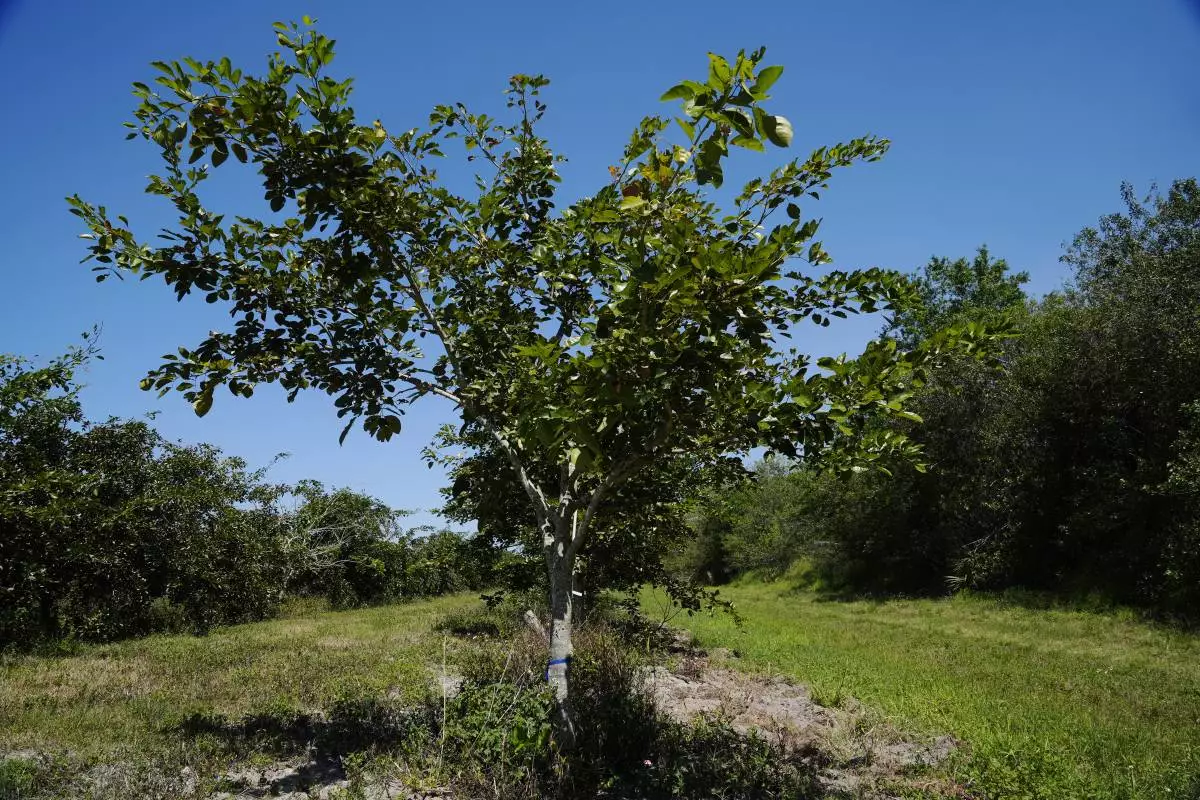
Pongamia trees grow in a grove in St. Lucie County, Fla., Thursday, March 20, 2024. The ancient tree, native to India, Southeast Asia and Australia, is now thriving in groves where citrus trees once flourished in Florida. The tree produces a legume that can be processed into plant-based protein and sustainable biofuel. (AP Photo/Marta Lavandier)
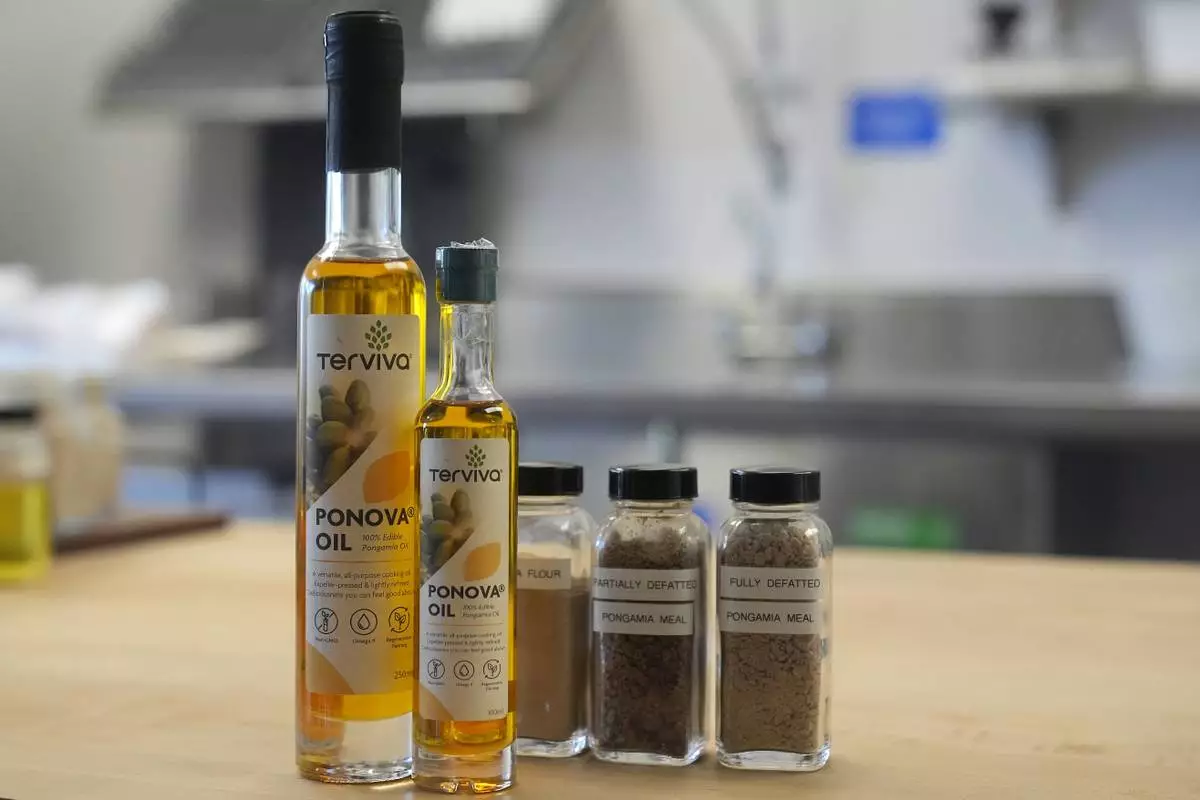
Bottles of Ponova Oil and other products made from the pongomia beans are shown at Terviva's headquarters in Alameda, Calif., Thursday, May 9, 2024. (AP Photo/Jeff Chiu)
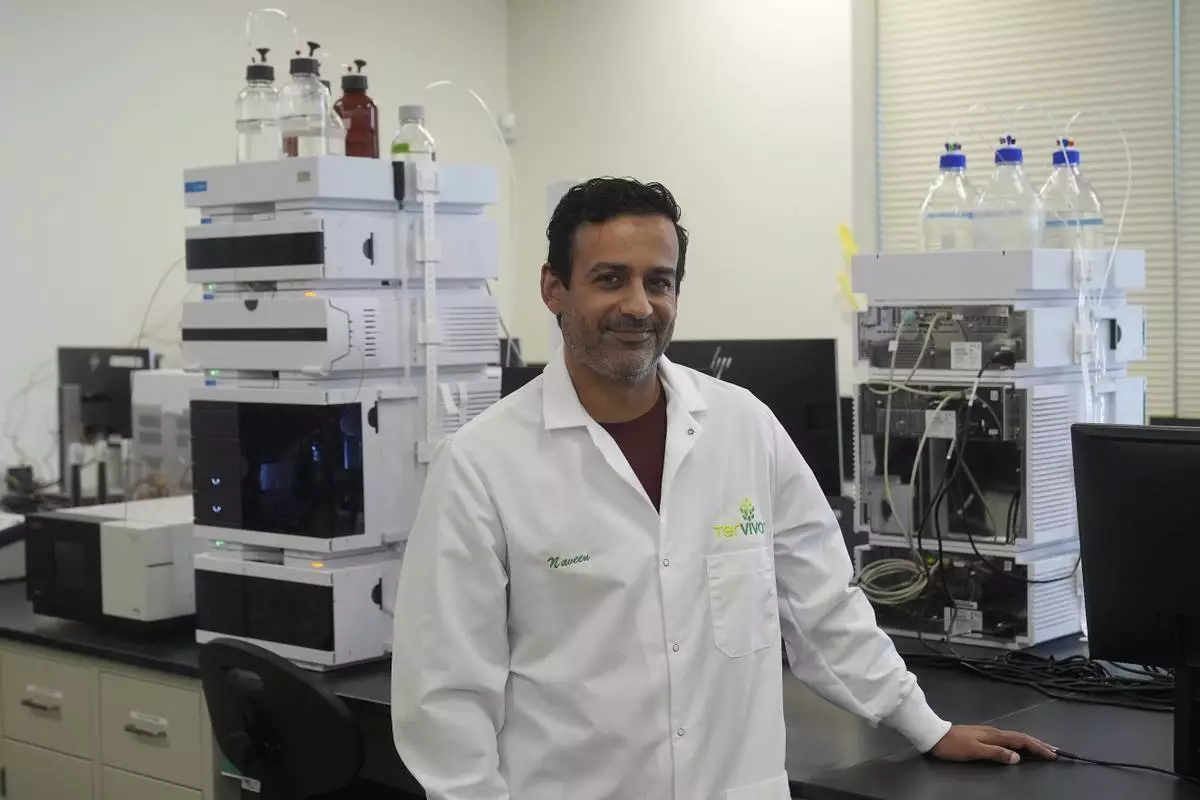
Naveen Sikka, founder and CEO of Terviva, stands in the lab at the company's headquarters in Alameda, Calif., Thursday, May 9, 2024. The company patented a process to remove the bitter taste of the pongamia tree legume. The small, brown legume is now being used to produce several products, including Panova table oil, Kona protein bars and protein flour. The legume also produces an oil that can be used as a biofuel, largely for aviation. (AP Photo/Jeff Chiu)
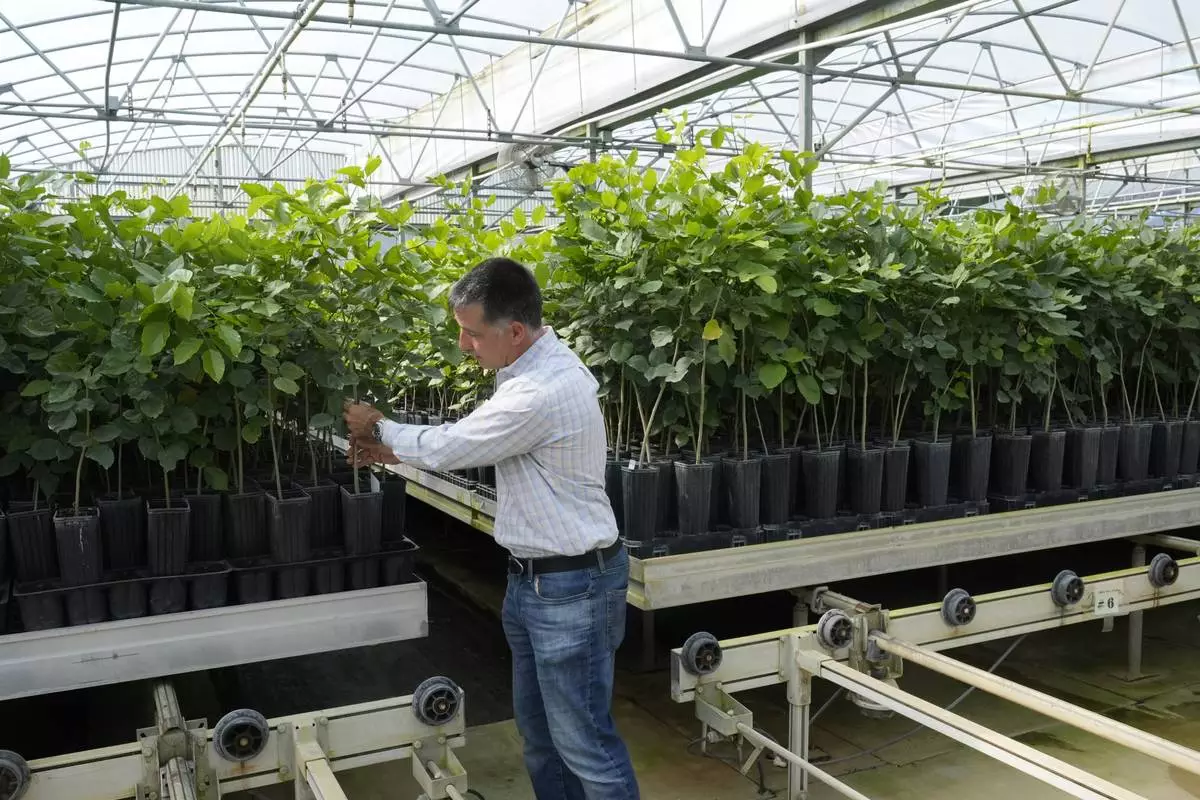
John Young, Terviva's customer success manager, inspects small pongamia trees at its nursery, Thursday, March 21, 2024, in Fort Pierce, Fla. Once the trees are planted, they don't need fertilizer or pesticides. They flourish in drought or rainy conditions. They also don't require teams of workers to pick the beans. A machine simply shakes the tiny beans from the branches when they're ready to harvest. (AP Photo/Marta Lavandier)
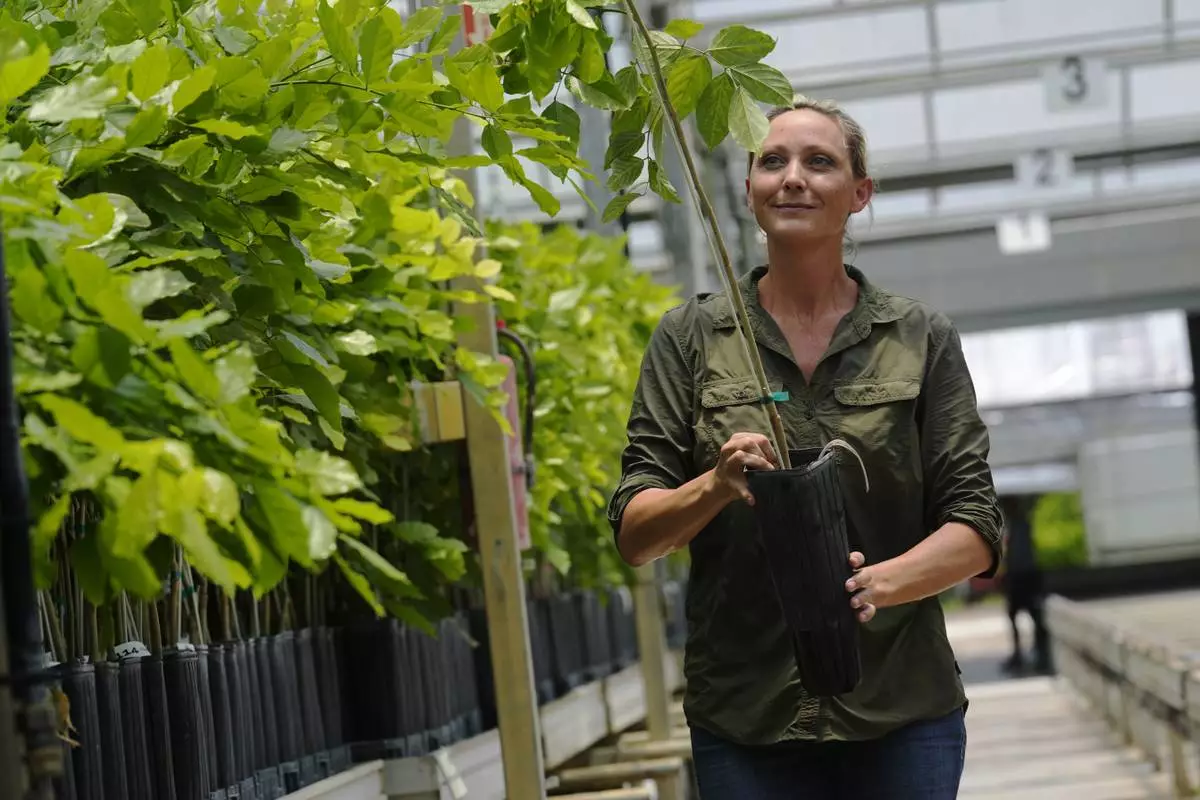
Elisabeth Beagle, Terviva's director of tree operations, moves a small pongamia tree at its nursery, Thursday, June 6, 2024, in Fort Pierce, Fla. The company produces and plants trees that are clonal replicas of its proprietary cultivars. (AP Photo/Marta Lavandier)
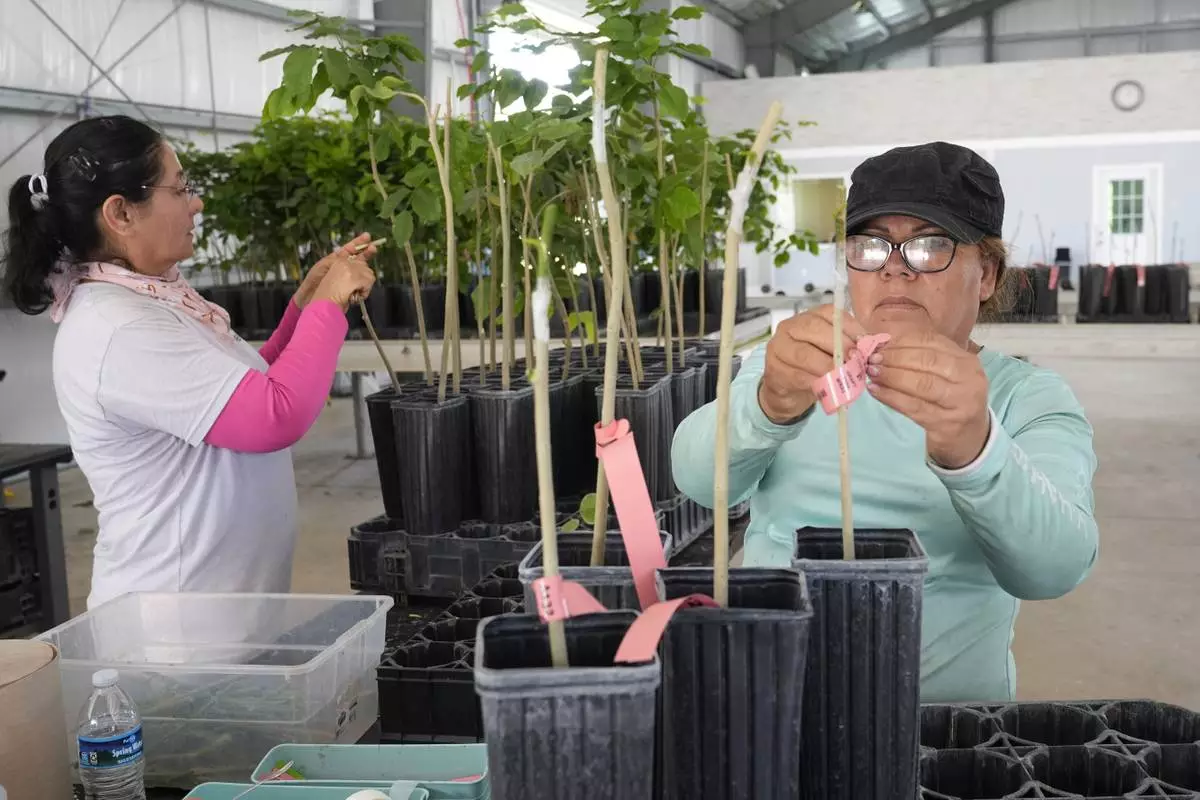
Terviva employees graft and mark young pongamia trees at the company's nursery, Thursday, June 6, 2024, in Fort Pierce, Fla. The company produces and plants trees that are clonal replicas of its proprietary cultivars. (AP Photo/Marta Lavandier)
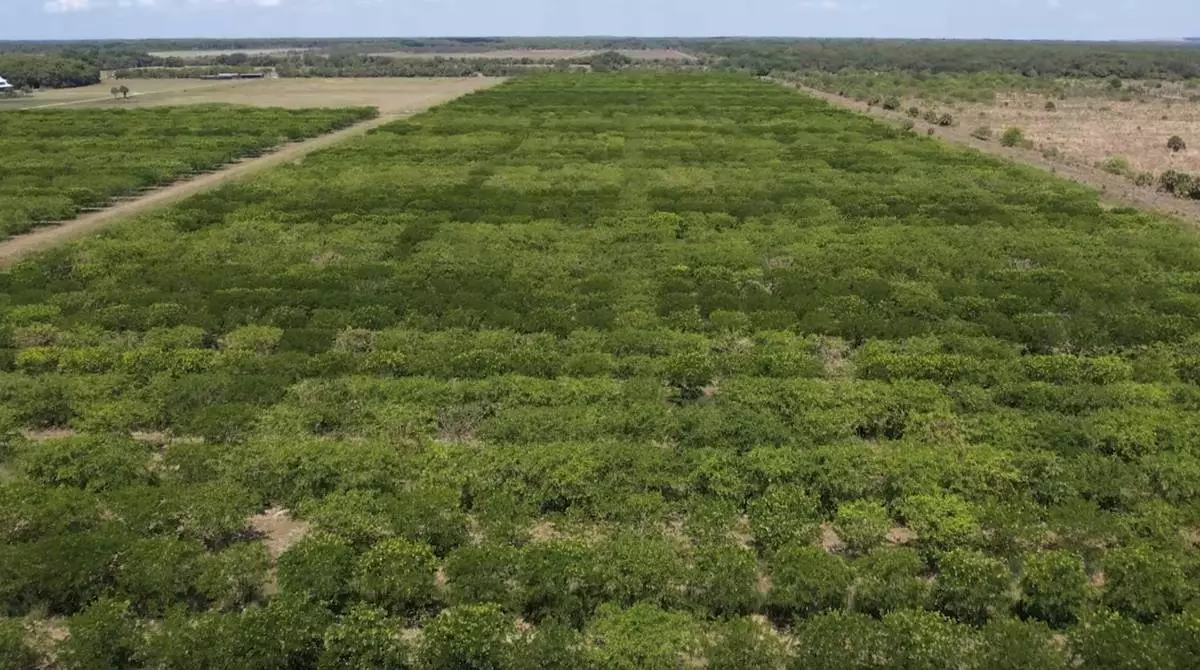
Pongamia trees grow in a former citrus grove, Thursday, June 6, 2024, in St. Lucie County, Fla. As large parts of the Sunshine State's once-famous citrus industry have all but dried up over the past couple of decades due to greening and citrus canker, some farmers are turning to the pongamia tree, a climate-resilient tree with the potential to produce plant based proteins and a sustainable biofuel. (AP Photo/Daniel Kozin)
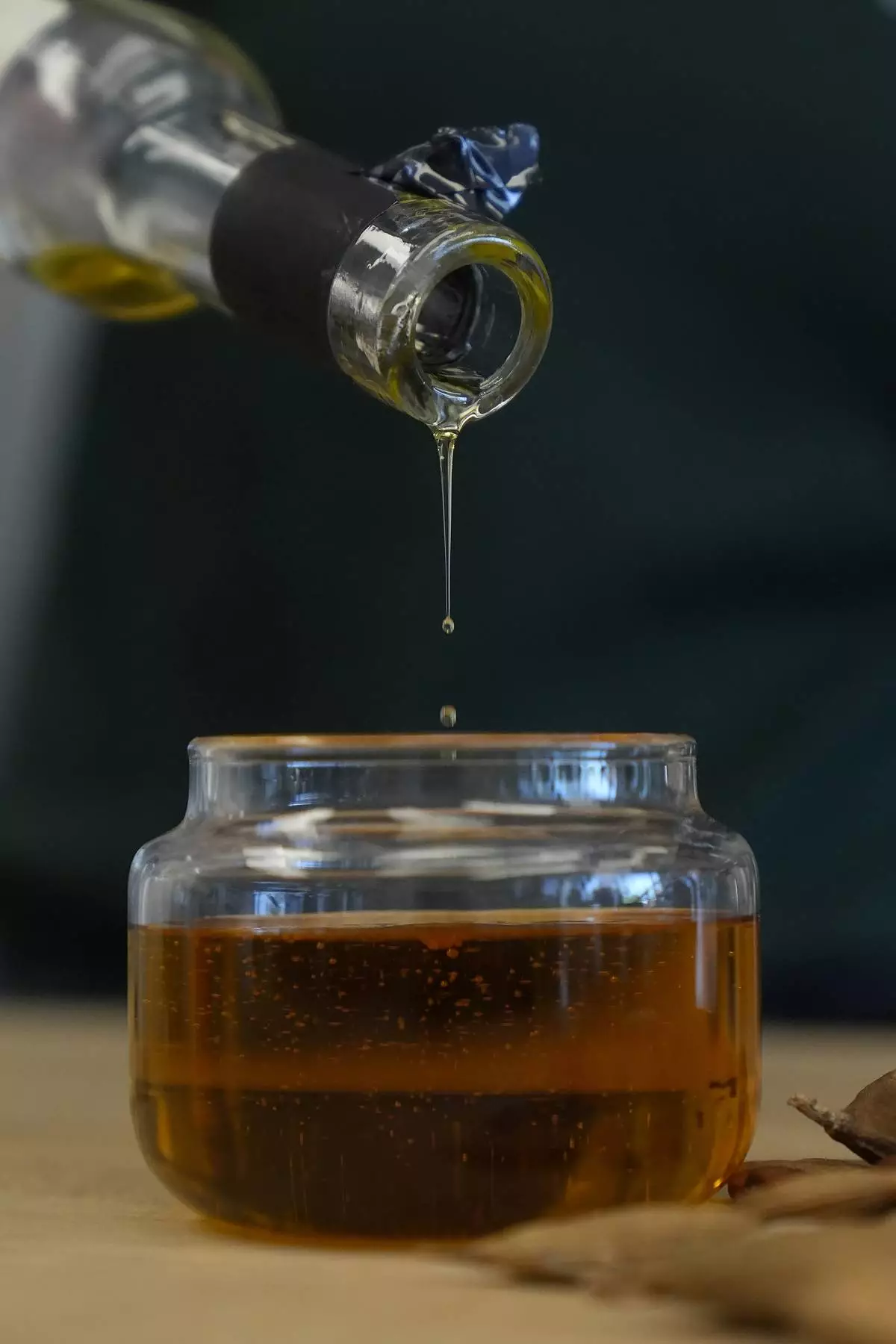
Ponova Oil is poured into a container at the Terviva headquarters in Alameda, Calif., Thursday, May 9, 2024. The oil, which is high in Omega 9 is made from the pongamia tree legume. The company has patented a process to remove the biopesticides from the pongamia tree legume that cause a bitter taste, making the bean suitable for food production. (AP Photo/Jeff Chiu)
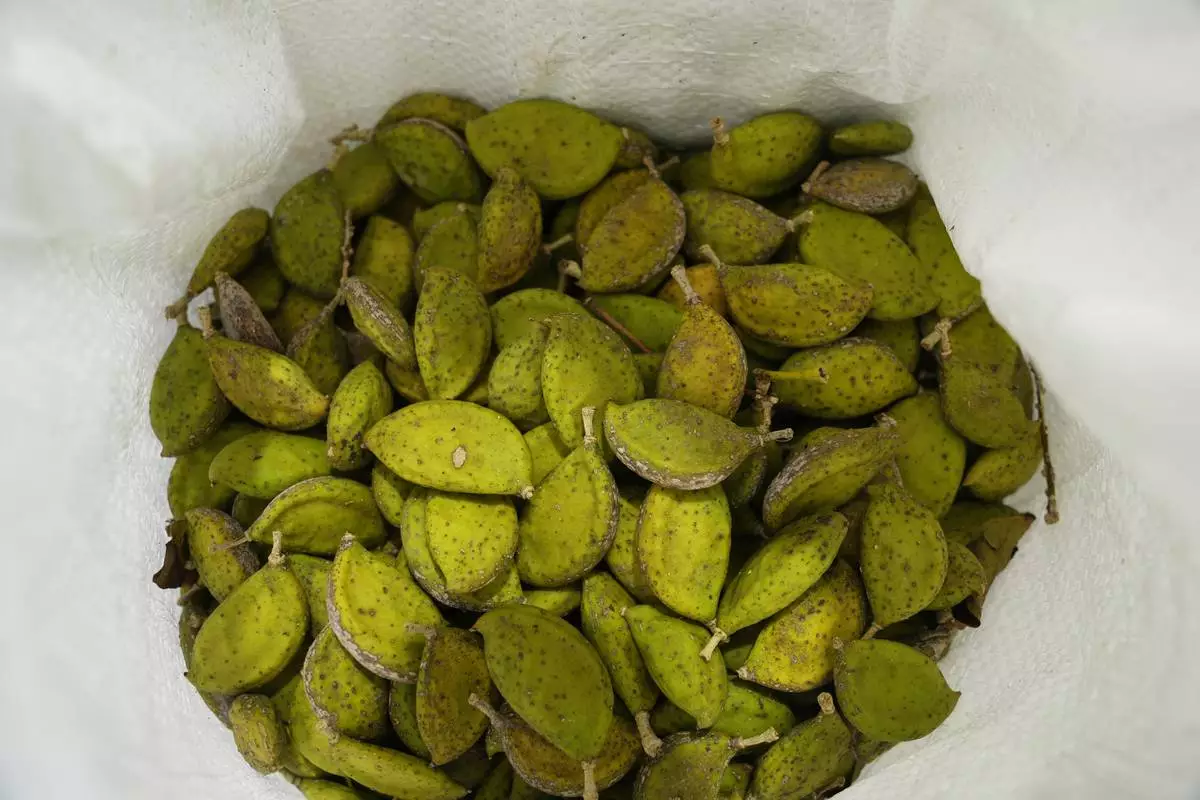
A bag of harvested Pongamia legume pods slowly dries out at the Terviva nursery, Thursday, March 21, 2024, in Fort Pierce, Fla. The ancient tree, native to India, Southeast Asia and Australia, is now thriving in groves where citrus trees once flourished in Florida. The tree produces a legume that can be processed into plant-based protein and sustainable biofuel. (AP Photo/Marta Lavandier)
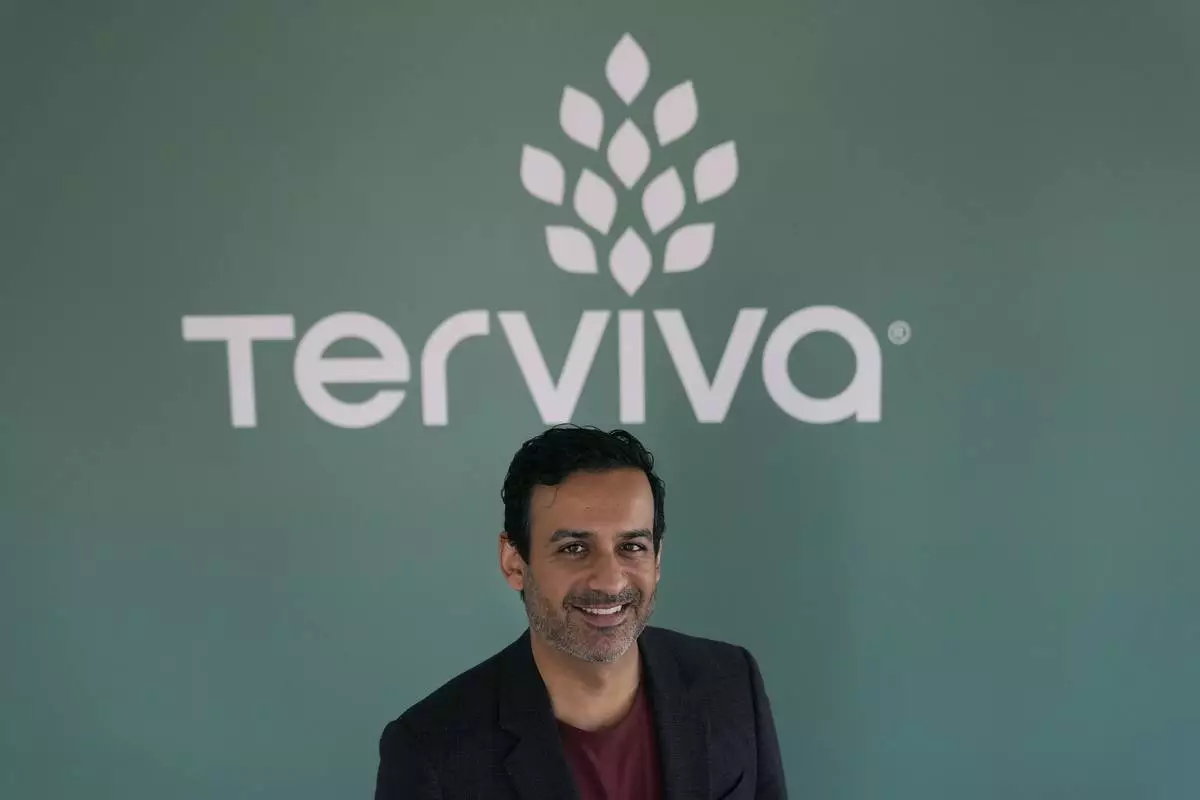
Naveen Sikka, founder and CEO of Terviva, poses for a portrait at the company's headquarters in Alameda, Calif., Thursday, May 9, 2024. Founded in 2010, the company works with farmers to grow pongamia trees, which are climate resilient and produce a high-protein legume. (AP Photo/Jeff Chiu)
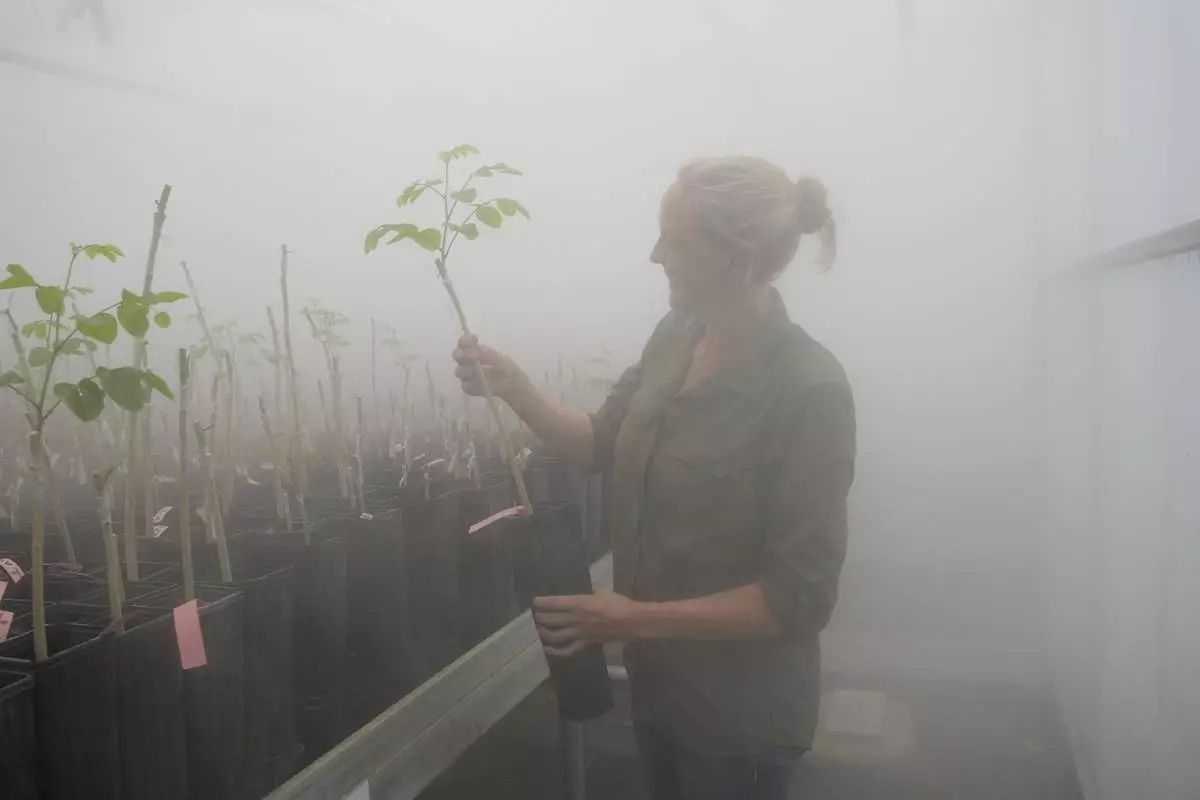
Elisabeth Beagle, Terviva's director of tree operations, places a newly grafted pongamia tree in a high- humidity greenhouse at the company's nursery, Thursday, June 6, 2024, in Fort Pierce, Fla. The tree produces a legume that is now being used to produce several products, including Panova table oil, Kona protein bars and protein flour. (AP Photo/Marta Lavandier)
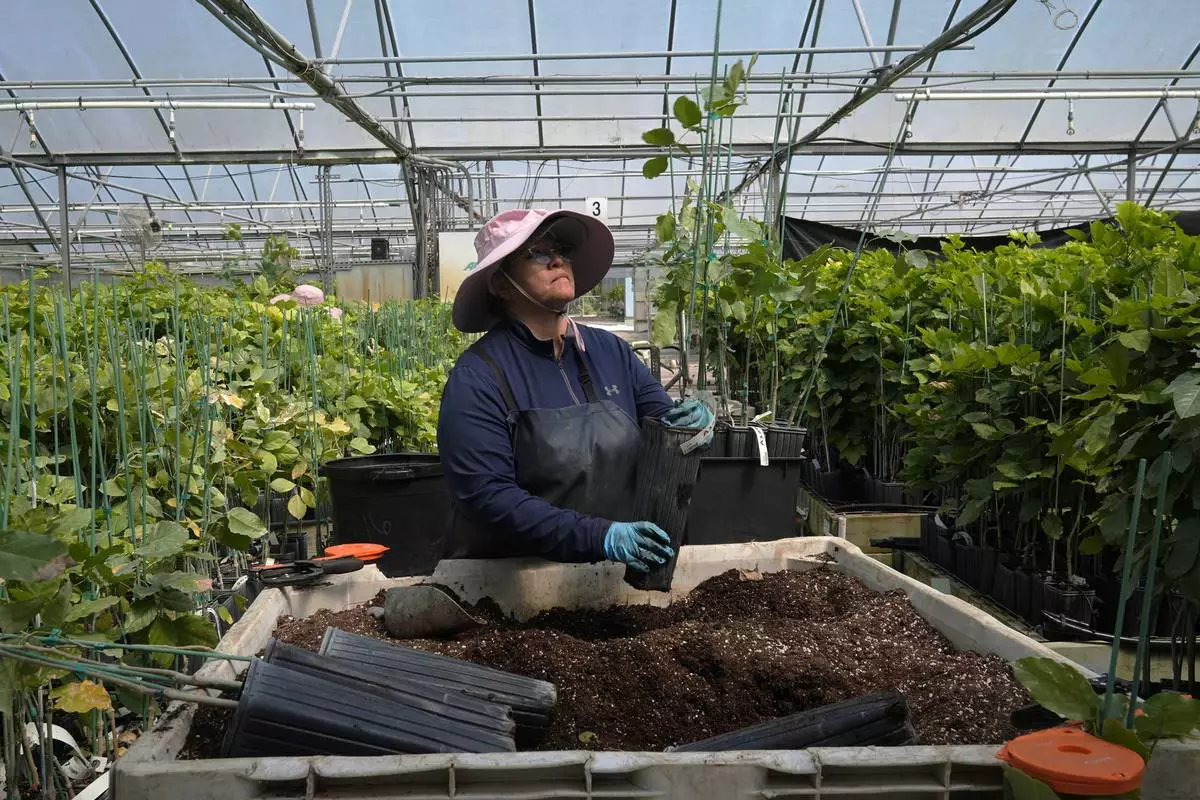
A Terviva employee puts a pongamia tree in a larger pot at the company's nursery, Thursday, March 21, 2024, in Fort Pierce, Fla. The tree grows in wet and dry soils and is mostly pest resistant. It also adds nitrogen to the soil and stores carbon, which helps to mitigate the effects of climate change. California-based Terviva has removed the bitterness from the pongamia bean to make it edible. (AP Photo/Marta Lavandier)
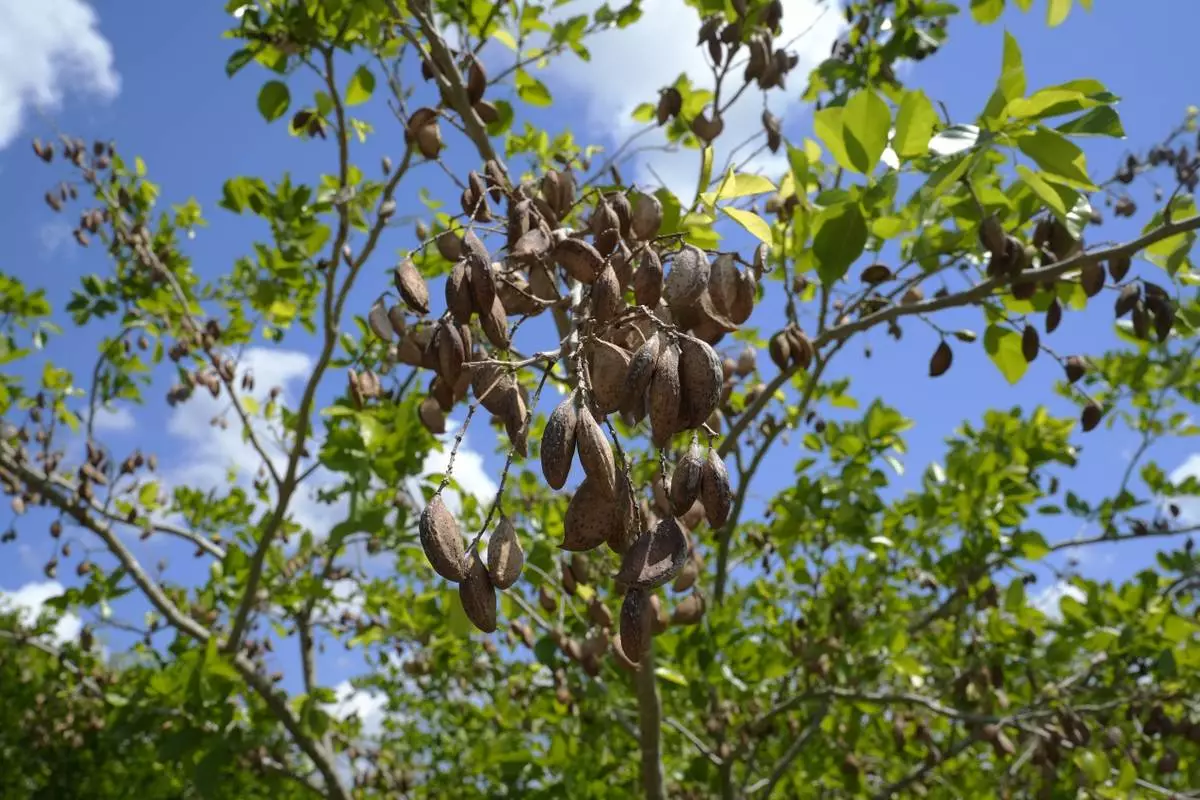
The pods of a pongamia tree are ready to pick at a grove, Thursday, June 6, 2024, in St. Lucie County, Fla. The legume of the pongamia tree produces a plant-based protein high in Omega 9. It also has the potential to produce a sustainable biofuel. (AP Photo/Marta Lavandier)
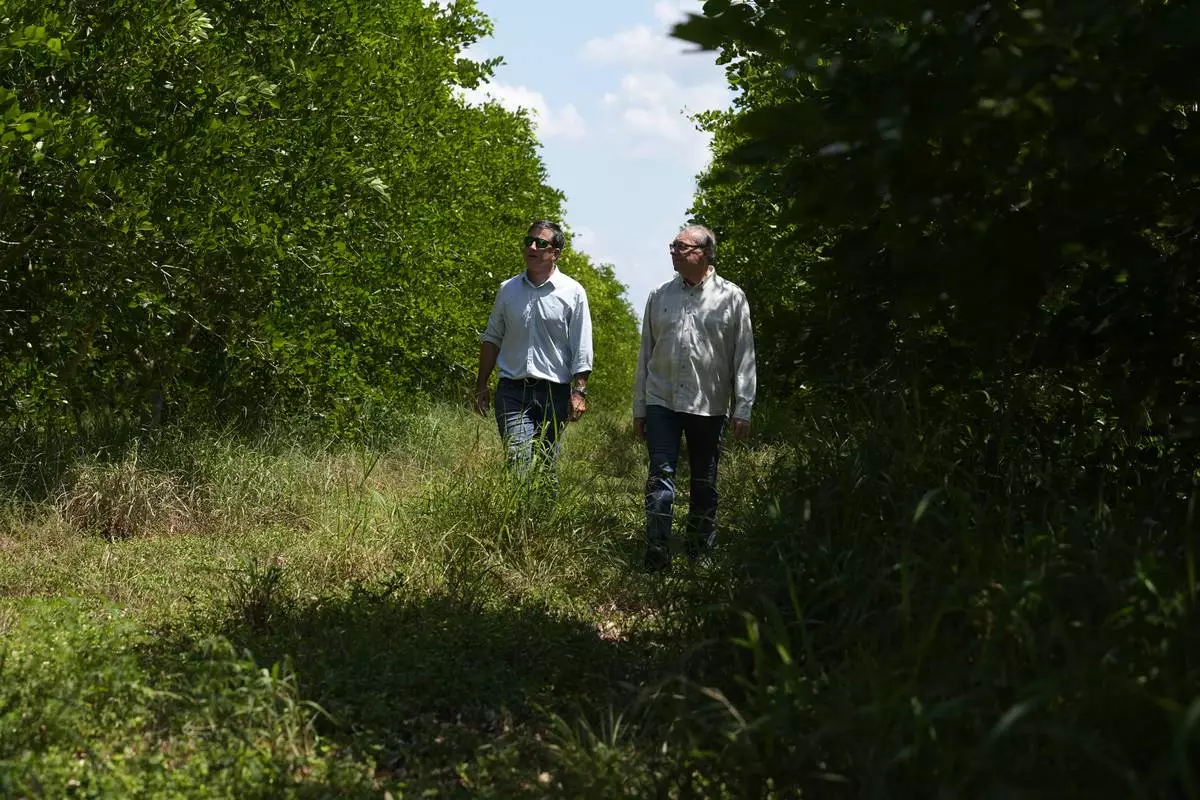
Terviva's John Young, left, and Ron Edwards walk in a grove of pongamia trees, Thursday, June 6, 2024, in St. Lucie County, Fla. Terviva, a San Francisco-based company founded in 2010, has patented a process to remove the biopesticides from the pongamia tree legume that cause a bitter taste, making the bean suitable for food production. (AP Photo/Marta Lavandier)
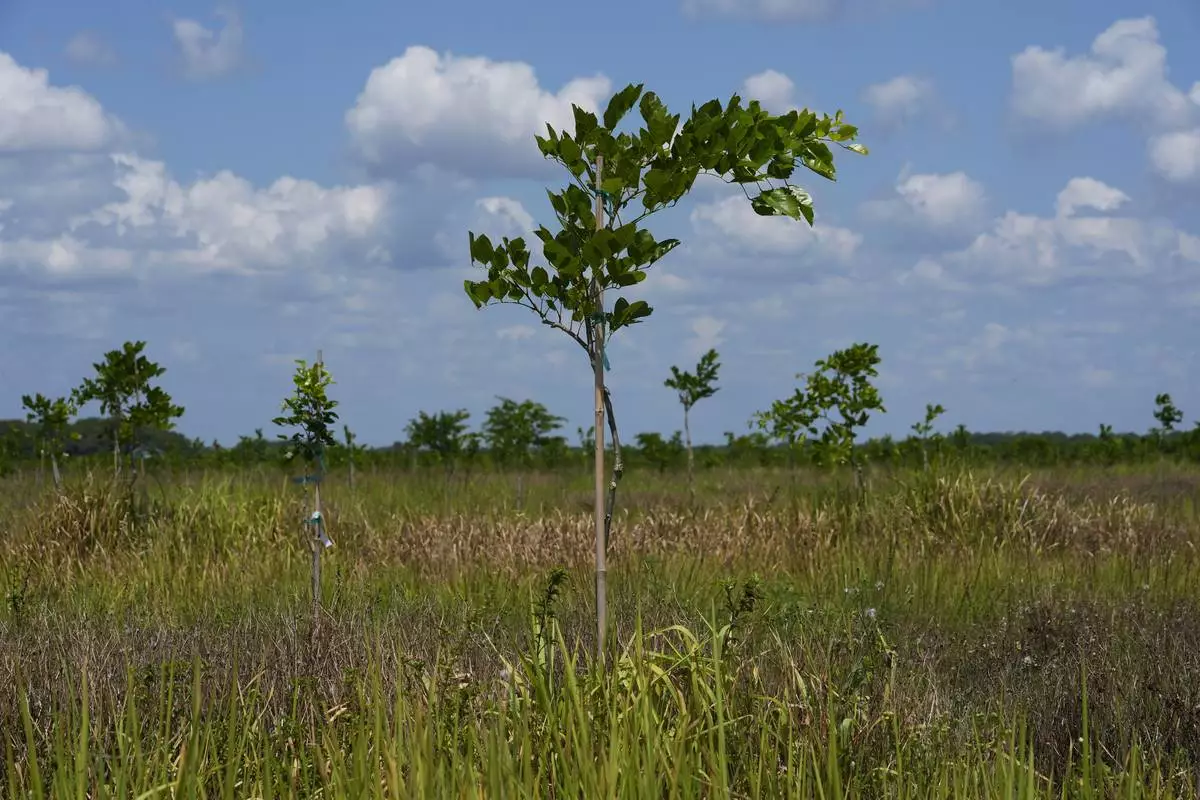
Young pongamia trees grow in a grove in St. Lucie County, Fla., Thursday, June 6, 2024. The ancient tree, native to India, Southeast Asia and Australia, is now thriving in groves where citrus trees once flourished in Florida. The tree produces a legume that can be processed into plant-based protein and sustainable biofuel. (AP Photo/Marta Lavandier)
NEW YORK (AP) — UnitedHealthcare CEO Brian Thompson was shot and killed Wednesday morning in what police said was a “brazen, targeted attack” outside a Manhattan hotel where the health insurer was holding an investor conference.
The 50-year-old executive was shot around 6:45 a.m. as he walked alone to the New York Hilton Midtown from a nearby hotel, police said. The gunman appeared to be “lying in wait for several minutes” before approaching Thompson from behind and opening fire, New York City Police Commissioner Jessica Tisch said. Police had not yet established a motive.
“Many people passed the suspect, but he appeared to wait for his intended target,” Tisch said, adding that the shooting "does not appear to be a random act of violence.”
Thompson was struck at least once in the back and once in the calf, Tisch said. He was taken to a hospital, where he was pronounced dead.
The suspect, dressed in a hooded sweatshirt and carrying a distinct gray backpack, then fled on foot down an alleyway before pedaling an e-bike into Central Park a few blocks away. The shooter was at large, sparking a search that included police drones, helicopters and dogs.
“We are deeply saddened and shocked at the passing of our dear friend and colleague Brian Thompson, the CEO of UnitedHealthcare," the insurer's parent company, UnitedHealth Group, said in a statement.
“Brian was a highly respected colleague and friend to all who worked with him,” the company said. "We are working closely with the New York Police Department and ask for your patience and understanding during this difficult time.”
Police issued a poster showing a surveillance image of the suspect pointing what appeared to be a gun and another image that appeared to show the same person on a bicycle. Police offered a reward of up to $10,000 for information leading to an arrest and conviction.
The killing shook a part of New York City that's normally quiet at that hour, happening about four blocks from where tens of thousands of people are set to gather Wednesday night for the annual Rockefeller Center Christmas tree lighting.
Police sought to reassure New Yorkers and promised extra security for the tree lighting, which will go on as scheduled.
“We’re encouraging New Yorkers to go about their daily lives and their daily business but to be alert,” NYPD Chief of Department Jeffrey Maddrey said.
Investigators recovered several 9 mm shell casings from outside the hotel and a cellphone from the alleyway through which the suspect fled. They were also searching Thompson's hotel room and interviewing his UnitedHealthcare colleagues, Chief of Detectives Joseph Kenny said.
Thompson’s wife, Paulette Thompson, told NBC News that the executive told her "there were some people that had been threatening him.” She said she didn't have details, but suggested they may have involved issues with insurance coverage.
UnitedHealthcare is the insurance arm of the health care giant UnitedHealth Group Inc.
The Minnetonka, Minnesota-based company was scheduled to have its annual meeting with investors in New York City to update Wall Street on the company's direction and expectations for the coming year, according to a company media advisory. The company ended the conference early in the wake of Thompson's death.
“I’m afraid that we — some of you may know we’re dealing with a very serious medical situation with one of our team members,” a company official told attendees, according to a transcript. “And as a result, I’m afraid we’re going to have to bring to a close the event today. ... I’m sure you’ll understand.”
Thompson had served as CEO for more than three years and had been with the company since 2004.
UnitedHealthcare is the largest provider of Medicare Advantage plans in the U.S. and manages health insurance coverage for employers and state-and federally funded Medicaid programs.
Minnesota Gov. Tim Walz tweeted that the state is “sending our prayers to Brian’s family and the UnitedHealthcare team.”
“This is horrifying news and a terrible loss for the business and health care community in Minnesota,” the Democrat wrote.
The New York Hilton Midtown is a short walk from tourist sites, including Rockefeller Center and the Museum of Modern Art, and is often dense with tourists and workers on weekday mornings. Part of the block where the shooting took place was cordoned off with police tape, with a large contingent of police officers at the scene. Many security cameras are nearby.
Associated Press writers Tom Murphy in Indianapolis and Steve Karnowski in St. Paul, Minn., contributed to this story.

Members of the New York police crime scene unit investigate bullets lying on the sidewalk at the scene outside the Hilton Hotel in midtown Manhattan where Brian Thompson, the CEO of UnitedHealthcare, was fatally shot, Wednesday, Dec. 4, 2024, in New York. (AP Photo/Stefan Jeremiah)

A New York police officer stands outside the Hilton Hotel in midtown Manhattan where Brian Thompson, the CEO of UnitedHealthcare, was fatally shot, Wednesday, Dec. 4, 2024, in New York. (AP Photo/Stefan Jeremiah)

A New York police officer stands outside the Hilton Hotel in midtown Manhattan where Brian Thompson, the CEO of UnitedHealthcare, was fatally shot, Wednesday, Dec. 4, 2024, in New York. (AP Photo/Stefan Jeremiah)

Members of the New York police crime scene unit pick up cups marking the spots where bullets lie as they investigate the scene outside the Hilton Hotel in midtown Manhattan where Brian Thompson, the CEO of UnitedHealthcare, was fatally shot Wednesday, Dec. 4, 2024, in New York. (AP Photo/Stefan Jeremiah)

Members of the New York police crime scene unit photograph bullets lying on the sidewalk as they investigate the scene outside the Hilton Hotel in midtown Manhattan where Brian Thompson, the CEO of UnitedHealthcare, was fatally shot, Wednesday, Dec. 4, 2024, in New York. (AP Photo/Stefan Jeremiah)

Bullets lie on the sidewalk at the scene outside the Hilton Hotel in midtown Manhattan where Brian Thompson, the CEO of UnitedHealthcare, was fatally shot, Wednesday, Dec. 4, 2024, in New York. (AP Photo/Stefan Jeremiah)

Members of the New York police crime scene unit investigate bullets lying on the sidewalk at the scene outside the Hilton Hotel in midtown Manhattan where Brian Thompson, the CEO of UnitedHealthcare, was fatally shot, Wednesday, Dec. 4, 2024, in New York. (AP Photo/Stefan Jeremiah)

New York police homicide investigators walk outside the Hilton Hotel in midtown Manhattan where Brian Thompson, the CEO of UnitedHealthcare, was fatally shot, Wednesday, Dec. 4, 2024, in New York. (AP Photo/Stefan Jeremiah)
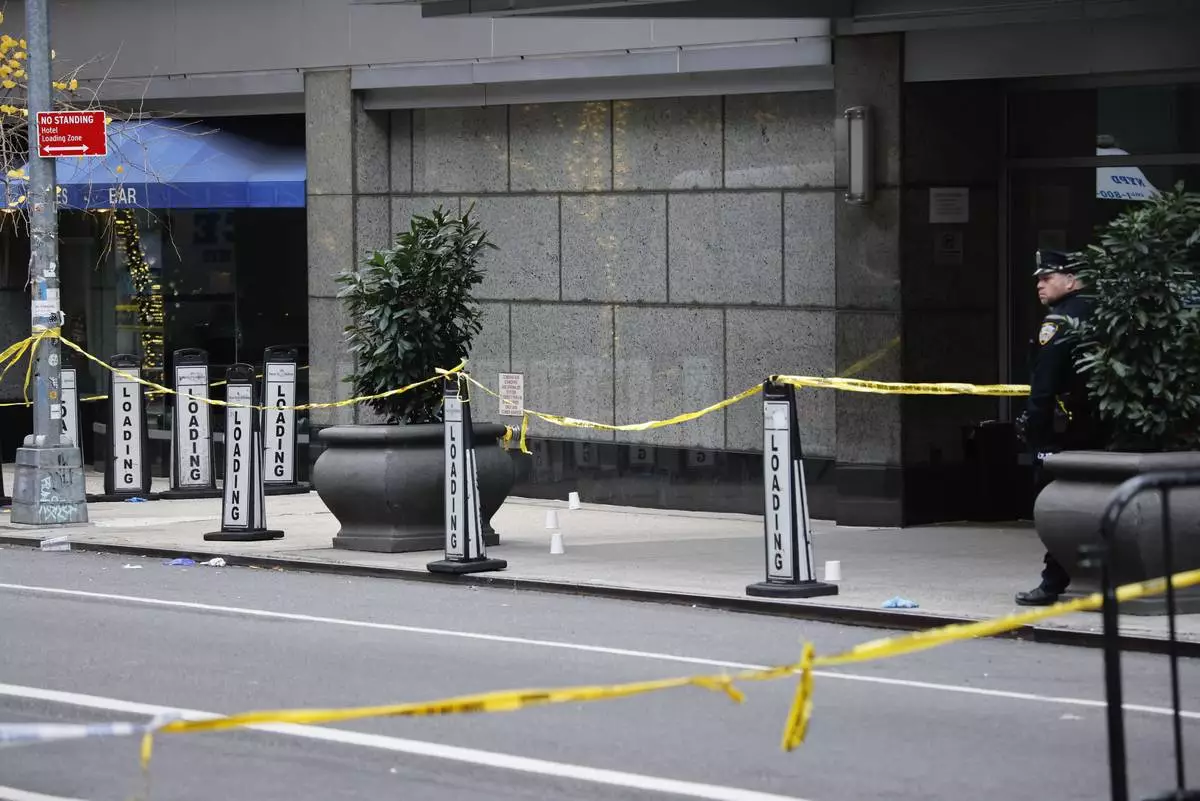
A New York police officer stands outside the Hilton Hotel in midtown Manhattan where Brian Thompson, the CEO of UnitedHealthcare, was fatally shot, Wednesday, Dec. 4, 2024, in New York. (AP Photo/Stefan Jeremiah)
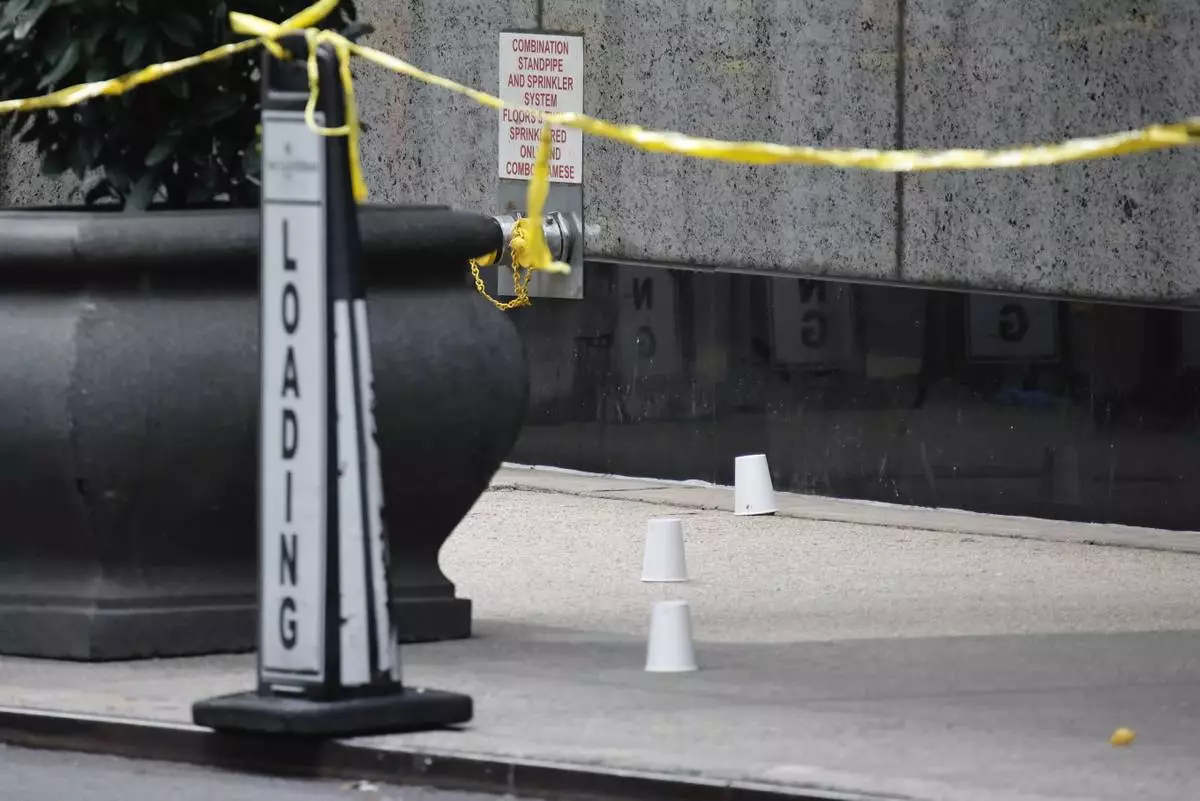
Paper cups mark spots at the scene outside the Hilton Hotel in midtown Manhattan where Brian Thompson, the CEO of UnitedHealthcare, was fatally shot, Wednesday, Dec. 4, 2024, in New York. (AP Photo/Stefan Jeremiah)

Members of the New York police crime scene unit investigate the scene outside the Hilton Hotel in midtown Manhattan where Brian Thompson, the CEO of UnitedHealthcare, was fatally shot, Wednesday, Dec. 4, 2024, in New York. (AP Photo/Stefan Jeremiah)

A New York police officer stands outside the Hilton Hotel in midtown Manhattan where Brian Thompson, the CEO of UnitedHealthcare, was fatally shot, Wednesday, Dec. 4, 2024, in New York. (AP Photo/Stefan Jeremiah)

The UnitedHealthcare headquarters in Minnetonka, Minn., lowered its flags to half-staff on Wednesday, Dec. 4, 2024, in honor of CEO Brian Thompson, who was fatally shot outside a hotel in New York. (Kerem Yücel/Minnesota Public Radio via AP)
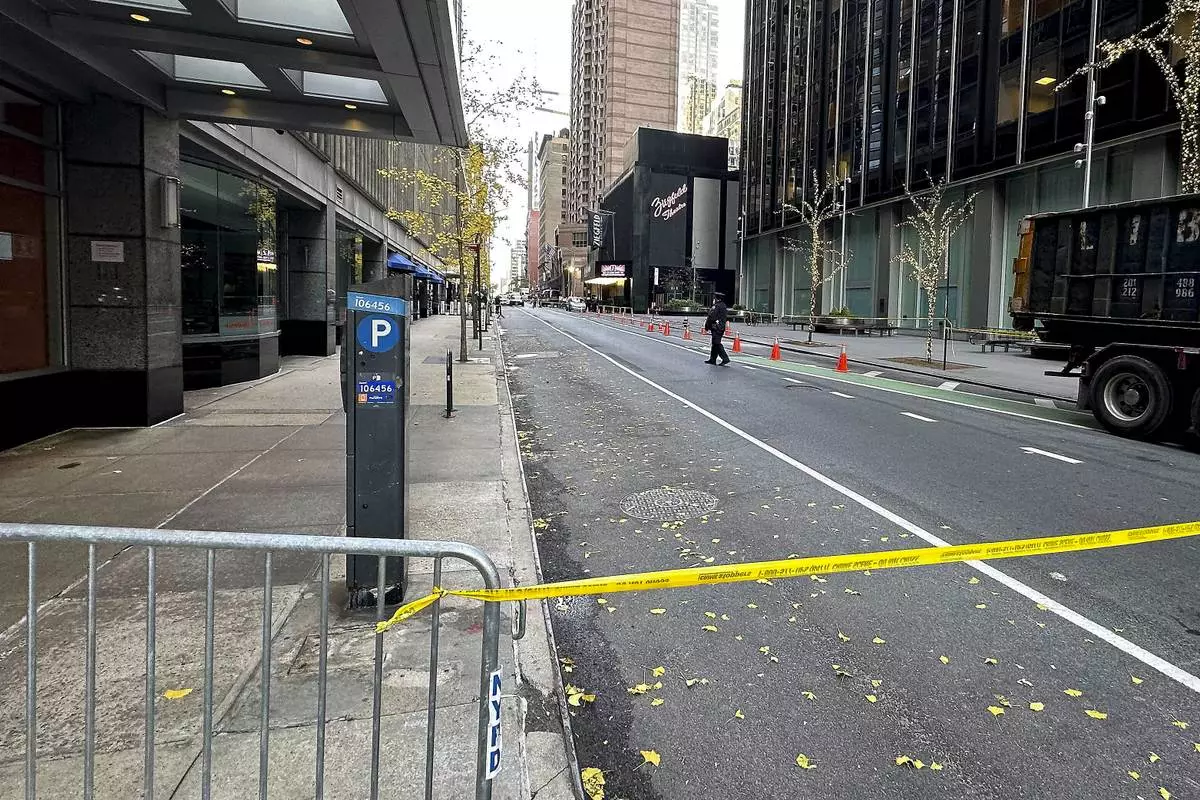
A New York police officer walks outside a hotel in midtown Manhattan where Brian Thompson, the CEO of UnitedHealthcare, was fatally shot Wednesday, Wednesday, Dec. 4, 2024, in New York. (AP Photo/Joe Frederick)

This combination of images provided by the New York City Police Department shows the suspect sought in the the killing of UnitedHealthcare CEO Brian Thompson outside a Manhattan hotel where the health insurer was holding an investor conference, Wednesday, Dec. 4, 2024. (New York City Police Department via AP)

This undated photo provided by UnitedHealth Group shows UnitedHealthcare chief executive officer Brian Thompson. (AP Photo/UnitedHealth Group via AP)

A New York police officer stands on 54th Street outside the Hilton Hotel in midtown Manhattan where Brian Thompson, the CEO of UnitedHealthcare, was fatally shot Wednesday, Dec. 4, 2024, in New York. (AP Photo/Stefan Jeremiah)

New York police homicide investigators walk outside the Hilton Hotel in midtown Manhattan where Brian Thompson, the CEO of UnitedHealthcare, was fatally shot Wednesday, Wednesday, Dec. 4, 2024, in New York. (AP Photo/Stefan Jeremiah)
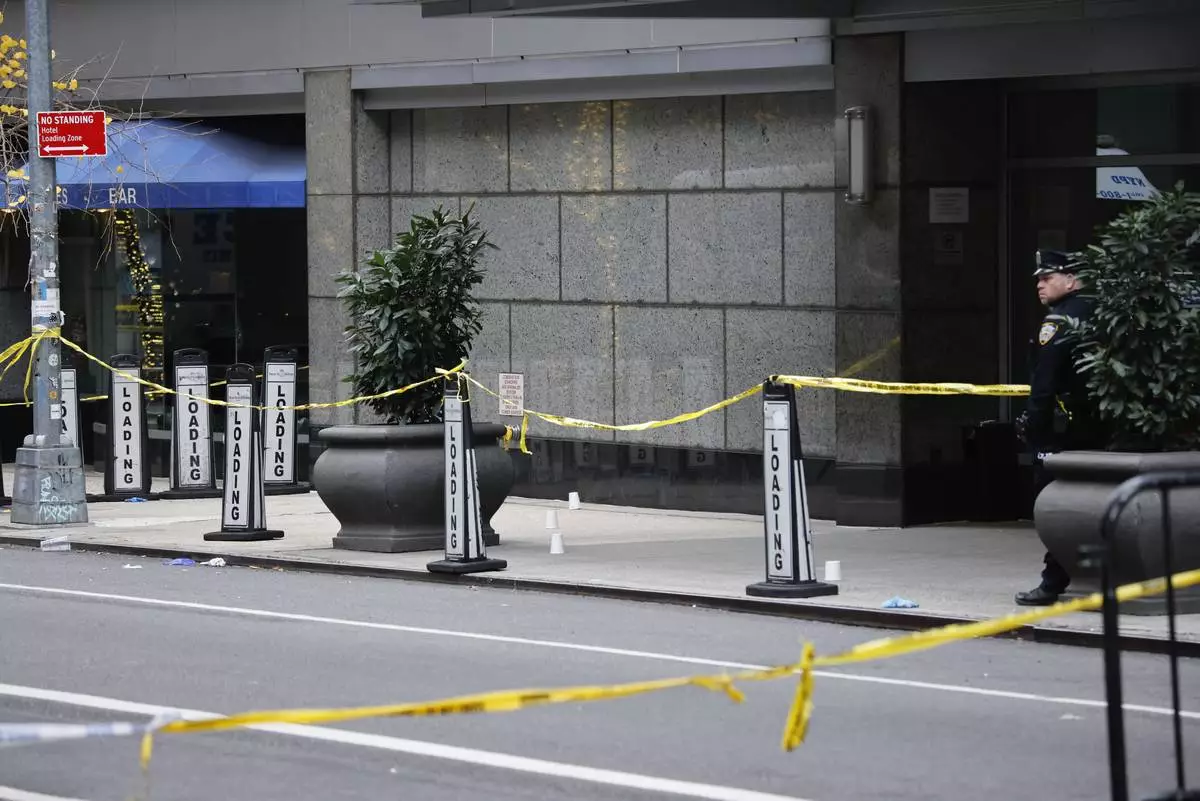
A New York police officer stands outside the Hilton Hotel in midtown Manhattan where Brian Thompson, the CEO of UnitedHealthcare, was fatally shot Wednesday, Wednesday, Dec. 4, 2024, in New York. (AP Photo/Stefan Jeremiah)
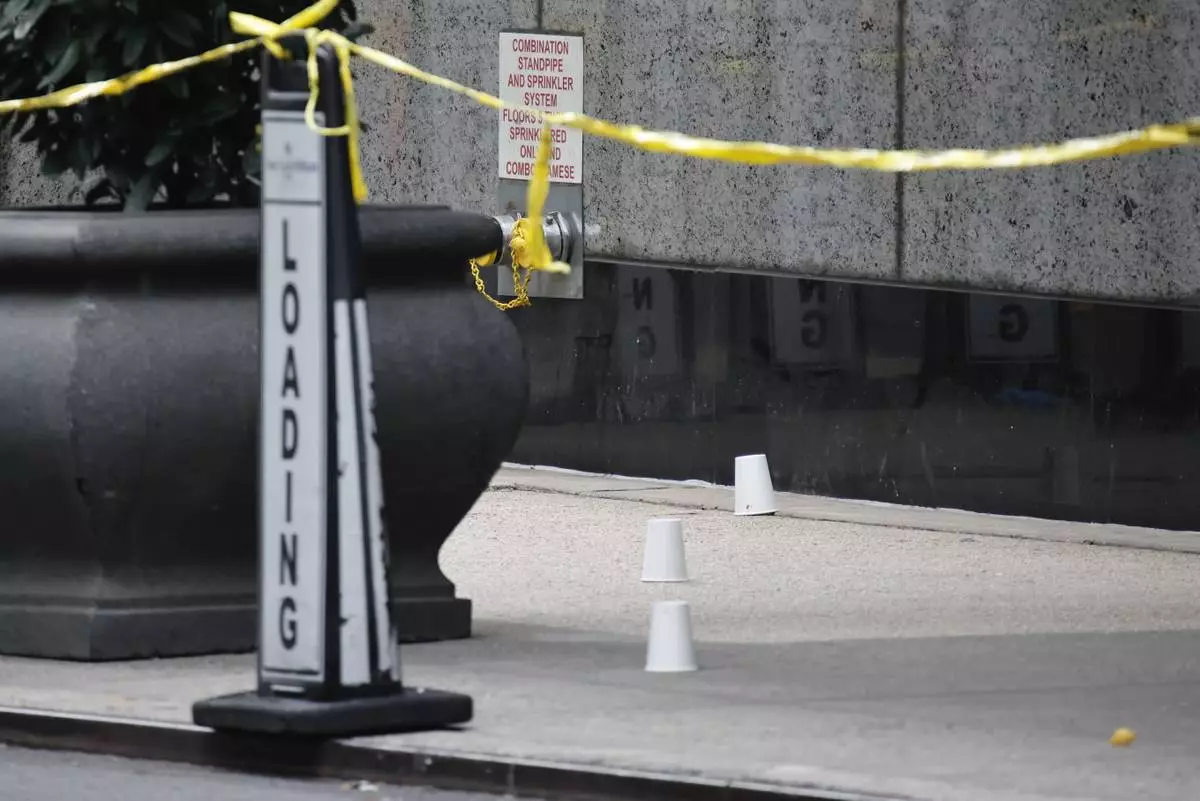
Paper cups mark spots at the scene outside the Hilton Hotel in midtown Manhattan where Brian Thompson, the CEO of UnitedHealthcare, was fatally shot Wednesday, Wednesday, Dec. 4, 2024, in New York. (AP Photo/Stefan Jeremiah)

Members of the New York police crime scene unit investigate the scene outside the Hilton Hotel in midtown Manhattan where Brian Thompson, the CEO of UnitedHealthcare, was fatally shot Wednesday, Wednesday, Dec. 4, 2024, in New York. (AP Photo/Stefan Jeremiah)

A New York police officer stands outside the Hilton Hotel in midtown Manhattan where Brian Thompson, the CEO of UnitedHealthcare, was fatally shot Wednesday, Wednesday, Dec. 4, 2024, in New York. (AP Photo/Stefan Jeremiah)

A New York police officer stands on 54th Street outside the Hilton Hotel in midtown Manhattan where Brian Thompson, the CEO of UnitedHealthcare, was fatally shot Wednesday, Dec. 4, 2024, in New York. (AP Photo/Stefan Jeremiah)

The UnitedHealthcare headquarters in Minnetonka, Minn., lowered its flags to half-staff on Wednesday, Dec. 4, 2024, in honor of CEO Brian Thompson, who was fatally shot outside a hotel in New York. (Kerem Yücel/Minnesota Public Radio via AP)

This undated photo provided by UnitedHealth Group shows UnitedHealthcare chief executive officer Brian Thompson. (AP Photo/UnitedHealth Group via AP)
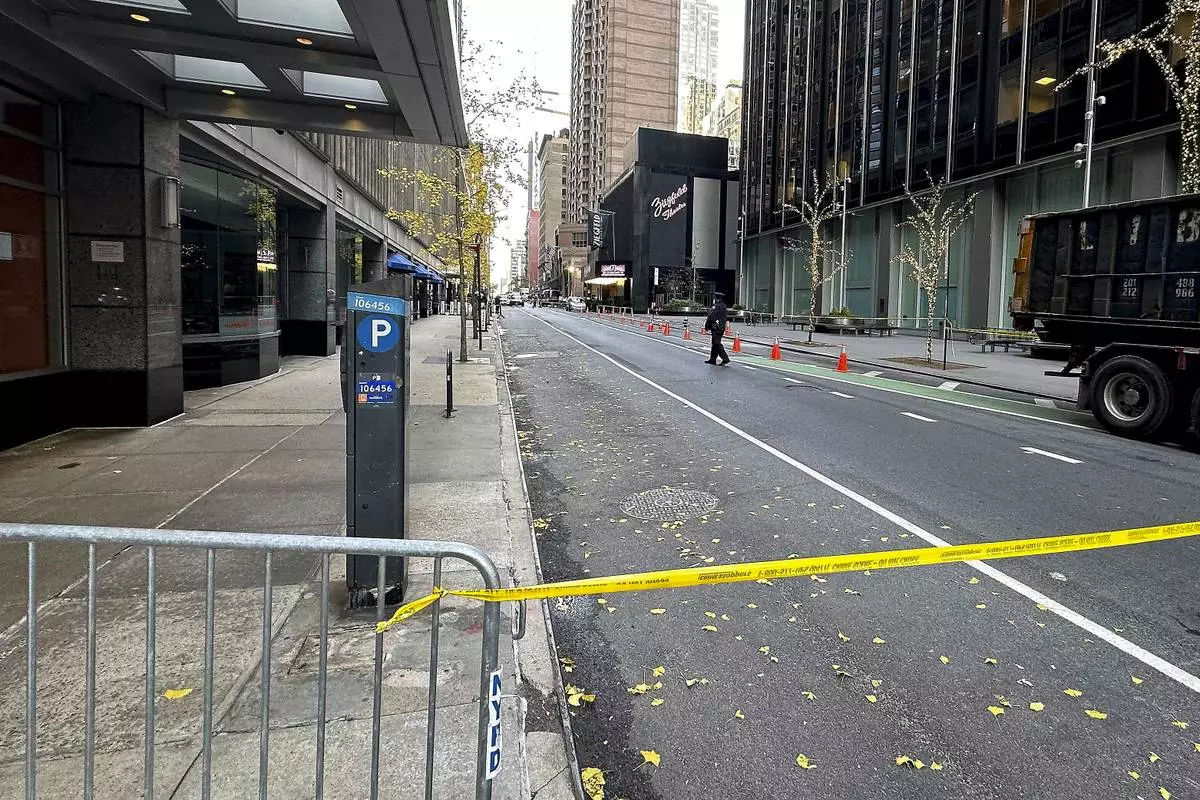
A New York police officer walks outside a hotel where a shooting occurred in midtown Manhattan, Wednesday, Dec. 4, 2024, in New York. (AP Photo/Joe Frederick)

















